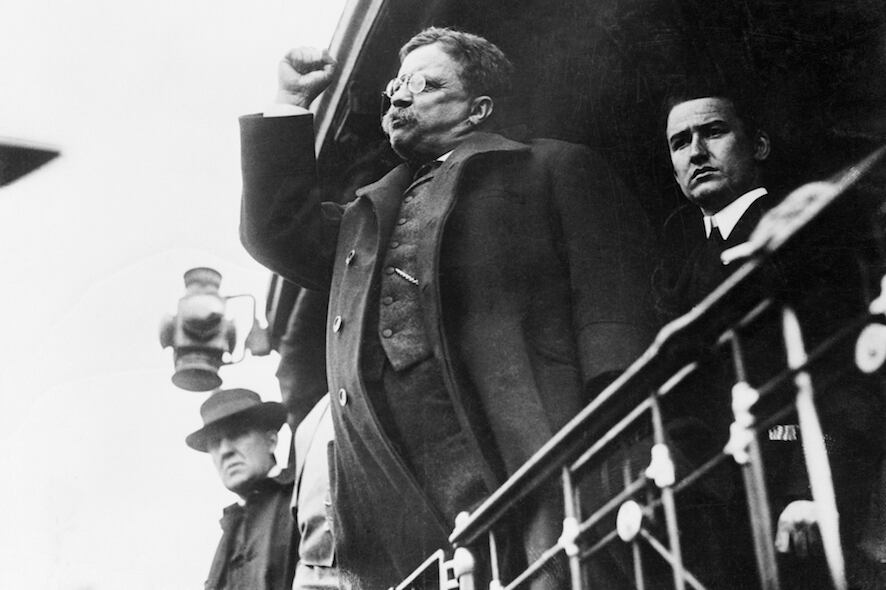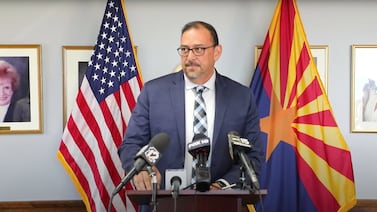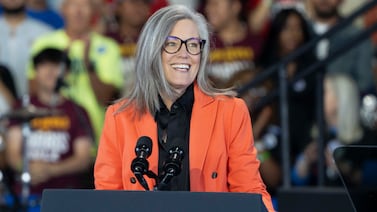A version of this post was originally distributed in Votebeat’s weekly newsletter. Sign up here.
As I spent the last several days creating Votebeat’s training program on voting rights, election administration, and cybersecurity for our future reporters, one of the books I read was Jon Meacham’s The Soul of America: The Battle for Our Better Angels. It looks at the role of the U.S. president during times of crisis and provides an excellent primer on the unmatched ability of the bully pulpit to bring civil rights advances. I wanted, for once, to read something that might make me hopeful, and that might help me figure out how to frame the halting progress of the civil rights battle in the United States, which still hasn’t been won. The weight of history was a necessary counterbalance to this week’s news, which brought a gripping reminder of the treatment of two Georgia poll workers who are now suing the rightwing conspiracy site Gateway Pundit for inciting months of harassment.
Their treatment was vicious. The women were subjected to death threats and even home visits from Gateway Pundit readers convinced the women had counted fake ballots, though of course they hadn’t. “I want the defendants to know that my daughter and I are real people who deserve justice,” one of the poll workers, Ruby Freeman, said in a statement, “and I never want them to do this to anyone else.” A Gateway Pundit article last December that identified Freeman by name seemed to revel in the treatment she would face. Its headline: “What’s Up, Ruby? Crooked Operative Filmed Pulling Out Suitcases of Ballots in Georgia IS IDENTIFIED.”
When Meacham published his book in 2018, the phrase “the soul of America” was not yet well worn on the political circuit — at least in modern parlance. Joe Biden would later make the battle for this country’s identity a key axiom of his campaign, promising to “restore the soul of America” in his first speech as president-elect. It had been, Biden said, eroded over the last four years of incredible upheaval and bitterness. But these things have not abated, and the past 10 months have not shown the Biden administration rising to the occasion.
For example, last month Vice President Kamala Harris — who has been placed in charge of the White House’s voting efforts — held a teleconference with the hundreds of groups that have been agitating against restrictive voting bills passed by multiple state legislatures. The activists walked away having heard no plan for advancing federal voting legislation, which is just as stuck as it was when Biden took office. One participant told The Guardian, “She said her five-minute remarks, which were the ‘same-old, same old’, and then she left.” Cliff Albright, a co-founder of Black Voters Matter, said the meeting felt like a “check-the-box kind of a call.”
Even though he has labeled the current voting landscape “Jim Crow 2.0,” Biden has not seen fit to pressure his party into a consensus on how to fight it, nor craft narrowly tailored bills that stand better chances of passage, nor unflinchingly call Republicans to the mat for their baseless rhetoric on voting fraud. He has not openly advocated for an infusion of funds for elections, though he has spent much of his political capital on new infrastructure spending and new social and climate spending.
Meacham’s book shows that this is not how great presidents have defined themselves in history. The bully pulpit that Teddy Roosevelt made famous has, in each administration, taken on its own life. Strong presidents, mobilizing national sentiment and often grief, have been able to make extreme headway on civil rights. Woodrow Wilson was able to use this to push through women’s suffrage, calling it “a new and good thing in the world.” Lyndon B. Johnson was famously able to use the office to force civil rights legislation. And Trump — just as effectively — was able to use it to tear at the fabric of trust in our institutions, in a way that no other president had ever attempted. He continues to do so from outside of the White House.
Our time of crisis is the moment for Biden’s administration to wield this power effectively on the issue of voting. After nearly a year in office, Biden’s approval ratings are plummeting and he has made no progress in stemming the tide of conspiracy and hate pouring into elections. The voting bills Congress has written are not perfect, and were written before Biden took office. Rather than advocate for practical advances, even if not all can be achieved at once, Biden has allowed the voting rights debate to happen without forcefully moving the needle.
Such a thing is, of course, a tall order, but one that many presidents before him have faced. Wilson certainly did not begin his tenure as a warrior for women’s suffrage — the sustained demands of the suffragettes who endured forced feedings in prison gave him the courage. Johnson found his mission thrust forward by the assassination of JFK and by Bloody Sunday in Selma, lending him that fierce urgency the era demanded.
LBJ presented a stark contrast to Kennedy on civil rights, as James H. Rowe — a longtime Democratic strategist — noted. “A senator would come to Kennedy and say ‘I’d love to go along with you Mr. President, but it would give me serious trouble back home.’ Kennedy would always say ‘I understand.’ Now Johnson knew damn well the senator was going to tell him that, and he never let the senator get to the point of his troubles back home. He would tell them about the flag, and by God, the story of the country, and he’d get them by the lapels and they were out the door. That’s why he got so much done, so fast.”
It worked even with the most entrenched racists of the day. After Bloody Sunday, LBJ called Alabama Gov. George Wallace to the White House, demanding he allow the marchers to finish their march and offer them protection. When Wallace quibbled, LBJ said, “Don’t you shit me, George Wallace.” And, refusing to relent, asked him: “What do you want left after you, when you die? Do you want a great big marble announcement that reads, ‘George Wallace — he built.’ Or, do you want a little piece of scrawny pine board lying across that harsh caliche soil that reads, ‘George Wallace — He hated.”
Wallace gave in, and later remarked, “Hell, if I’d stayed in there much longer he’d have had me coming out for civil rights.”
And those instigating events are here now. Jan. 6, which many on the right would prefer to forget, was an unprecedented attack on our nation’s capital. When President Biden gave his inaugural address, fewer than 20 days removed from this fateful moment, it seemed as if he, too, may harness the power of the office. “Here we stand looking out to the great Mall where Dr. King spoke of his dream. Here we stand, where 108 years ago at another inaugural, thousands of protestors tried to block brave women from marching for the right to vote. Today, we mark the swearing-in of the first woman in American history elected to national office – Vice President Kamala Harris,” he said.
But in the months that have followed, Republicans have sought to minimize the harm of Jan. 6. And Democrats have allowed the debate over the future of voting to pass them by, not answering in equal measure the depth and severity of misinformation the right trumpets on a daily basis. It is hard to wield the power of the bully pulpit if you never stand at it. Biden, mimicking his presidential campaign, has done little to forcefully craft his own message on the issue. He has given fewer press conferences in his first year than any president in modern history, and it took him an unprecedented 65 days to offer his first.
This, after he set lofty goals for himself on voting. It is not that I am holding him to an unfair or arbitrary standard — presidents have faced bigger problems, and Biden told us that he, and he specifically, was cut out for this one. “For our democracy and the work — and to deliver our work and [for] our people, it’s up to all of us to protect that right,” he said at the National Constitution Center in July. He noted that election administrators had “withstood unrelenting political attacks, physical threats, intimidation, and pressure” in order to carry out the 2020 election, which saw record-breaking turnout. He called legislation that rolled voting back “the most dangerous threat to voting and the integrity of free and fair elections in our history.” It is one of only a small handful of comments Biden has made on the issue and one of even fewer speeches — a striking reversal given the stakes as he defined them.
In his memoirs, LBJ wrote presciently of the challenges of the presidency. “The job of the president is to set priorities for the nation, and he must set them according to his own judgement and his own conscience,” he wrote. “Every man who occupies this position has to strain to the utmost ability to fill it.”
If Biden truly believes that we are in a battle for our nation’s soul, and truly believes that voting is the a priori right that governs all others, then the time to fight for it and do so without compromise, surely, is now. If Biden chooses to harness this energy and attention he still has time to leave a legacy that will be enshrined by future historians. The soul of America is still on the table.
Back Then
In 1985, political scientist Peter H. Argersinger reexamined the accusations of voter fraud during the Gilded Age — a period lasting from around the 1870s to 1900, and the very name of which connotes images of rampant fraud and abuse as wealth in the United States swelled. But examining the allegations, Argersinger finds that they are “highly emotional” and often based on sweeping generalizations of how elite members of society believed lower classes behaved, rather than hard evidence. What is striking then, as now, is actually how little fraud occurred given the strikingly low levels of oversight, especially by today’s standards.
In Other Voting News
- Former Wisconsin Supreme Court Justice Michael Gableman, who is now running the Republican-led investigation into the state’s 2020 election, has finally revealed whom taxpayers are paying to be on his staff. They include Trump administration official Andrew Kloster, who has repeatedly and falsely claimed that Trump won the 2020 election, and has been accused of accosting poll workers in Wisconsin while serving as a poll watcher. Gableman also turned heads this week when he insulted mayors in Wisconsin’s largest cities, the press and the “Zuckerberg money” he believes stole the election (the election was not stolen).
- The city of Chandler, Arizona, is testing out mobile voting using blockchain technology. Mobile voting is not currently legal in the state, so Arizona would have to change the law before Chandler could fully implement the system. Last year several MIT professors found blockchain voting technology would “come at the cost of losing meaningful assurance that votes have been counted as they were cast, and not undetectably altered or discarded.” Most experts agree this technology will not make mobile voting secure, and that paper ballot backups are the only current way to ensure votes are counted as cast.
- Mike Lindell continues to be a plague on the state of Washington. Washington Attorney General Bob Ferguson said his office was flooded with emails asking for his support of a draft lawsuit hosted on Lindell’s website. “I will not be doing that,” Ferguson tweeted.
- The recent elections in New York City and New Jersey broke records, but not any good ones. Both were among the lowest turnouts in modern history.
- Georgia Secretary of State Brad Raffensperger has filed suit against the U.S. Department of Justice related to what he says is a delay in returning his Freedom of Information Act request. The office filed a request for documents related to “whether the federal government is colluding or conspiring with outside groups to carry out a political agenda in suing over the state’s new election law.” The request seeks communication with Fair Fight Action, run by Stacey Abrams (who has just announced another run for governor); the Coalition for Good Governance; Latino Community Fund Georgia; and others.
- Embattled Colorado clerk Tina Peters attracted a crowd of more than 100 supporters this week in Grand Junction. It was one of several public appearances Peters has made since being stripped of her duties and having her home raided by federal authorities after allegedly leaked secure information about her county’s election system. Things are carrying on without her. Wayne Williams, former Colorado secretary of state, is one of two people who took over election duties for Peters. He told local media the hand recount of November’s election is going smoothly and running ahead of schedule.
Good Idea of the Week
We have said it before and we’ll say it again: Hurray for efforts to recruit young poll workers. This time, kudos to the Kentucky Secretary of State’s office for launching a partnership with the Kentucky YMCA Youth Association, which will hold youth voter registration drives, voter education seminars and “increase teen civic activity” through poll worker registration. “Our base of volunteer poll workers is aging out, and this partnership will help us find new ones as we prepare for the 2022 elections,” said Secretary of State Michael Adams.






